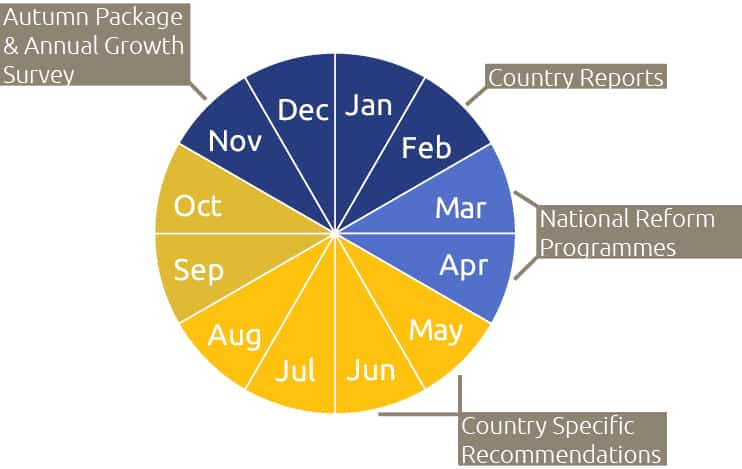The European semester is the EU’s annual cycle of economic and social policy coordination. It affects healthcare, early childhood education, unemployment, and social transfer and pension systems. The semester is also a tool and a mechanism which can help health agencies in their work, so it’s essential they understand what the it is and how to work with it. In this article we explore how the semester process works, how health bodies are already using it, and what more can be done.
By Alexandra Latham
Update, October 2019: Since this article was published, EuroHealthNet has published an analysis of the latest semester process. The information below remains correct, and will serve as an introduction to the new analysis.
The purpose of the European Semester, when it was introduced in 2010, was to help Member States to coordinate their economic policies and address common challenges. It is a cyclical process made of five components. The cycle begins in November when the European Commission publishes the Autumn Package which includes The Annual Growth Survey. The survey sets out the EU’s general economic priorities for the following year, and includes policy guidance for national governments. This is followed in February by Country Reports, which assess the economic and social policies in each country. In March/April, Member States submit National Reform Programmes which explain the specific policies they will implement to boost jobs and growth and comply with fiscal rules. At the same time, they submit three-year budget plans. In May/June, the Commission issues Country Specific Recommendations which are tailored economic and policy recommendations. From August- October, the recommendations are incorporated and policy is put into practice.
The role of the Semester is changing. The proposals for the EU’s next long-term budget, the Multiannual Financial Framework (MFF), suggest not only a stronger role for the Semester, but also an increased focus on social aspects. Linked to this is the European Pillar of Social Rights, which came into force in 2017. The ‘Social pillar’ is a set of principles, initiatives, recommendations, and monitoring measures which aim to make labour markets and welfare systems fairer and function better. It is directly connected to improving health; it includes principles such as ‘Everyone has the right to timely access to affordable, preventive and curative health care of good quality’. The MFF proposals state that in the future, the Semester can be used to monitor and implement social (including health) standards.

The semester can have an impact on health by influencing the macro-economic dimension of social protection systems funded through public budgets – including healthcare, early childhood education, unemployment, social transfer or pension systems. The European Semester addresses some of the fundamental determinants of health such as timely and affordable access to healthcare services of high quality (curative but increasingly more importantly – promoting and preventive), out-of-pocket healthcare payments, community-based care, and the conditions in which people live and work. In doing so, the Semester sends an important message about the high value of action in these areas and encourages governments to act.
It is crucial that health bodies understand how the semester will affect their work, and what role they can play in it. By understanding what is in the recommendations they can prepare for future policy changes. By making sure that the recommendations reflect reality ‘on the ground’ they can make sure that policy activities reflect their real needs.

There are several ways national and regional bodies can get involved. As a first step, all the documents and recommendations can be found on the Commission Website. The permanent representations of Member States to the European Union assess the Country Specific Recommendations and may then welcome evidence and information from national and local stakeholders. In some countries, it may be possible to have direct contact with national desk officers within the Commission. Further, committees within the EU council of Ministers may invite experts to provide evidence. EuroHealthNet is helping members analyse and use the Semester, and to navigate the sometimes complex paths to influence change.
Several of EuroHealthNet’s members are working effectively with the European Semester. This includes Slovenia’s National Institute of public health (NIJZ) and the Finnish federation for Social Affairs and health (SOSTE).

“Our CSR on active and healthy ageing initiated a much stronger collaboration between the Ministry of Health, and the Ministry of Labour, Family, Social Affairs and Equal Opportunities and the National Institute of Public Health (NIJZ) alongside many other key stakeholders. The CSRs were one of the key drivers for the Ministry of Health to make ageing a priority. With EU co-funding, NIJZ coordinated the two-year project AHA.SI (2014-2016,) addressing the social determinants of health and applying ‘health in all policies’ principles to promote active and healthy ageing. NIJZ follows CSRs closely to use the potentials arissing from the Semester processes” – Dr Mojca Gabrijelčič Blenkuš, Senior Advisor and EuroHealthNet President.

“SOSTE is involved in the European Semester process by collaborating with the European Commission’s Representation in Finland (country desk office). The European Pillar of Social Rights has accelerated the Finnish EC Representation’s interest to collaborate with wider stakeholder groups.
In drafting Finland’s country report, the EU delegation will hear various institutions, such as SOSTE, which will allow consultation of national decision-makers and other stakeholder expertise in health and social policy.
We produce a shadow report with recommendations based on the Country Report of Finland. The shadow report will be published before the publication of the European Commission’s Country Specific Recommendations. The aim is to influence to the European Commission’s Country Recommendations.” – Päivi Nykyri, Special Advisor at SOSTE and Vertti Kiukas, at SOSTE and EuroHealthNet board member.
A quick guide to Elements of the European Semester
Annual Growth Survey: A document which sets out the general economic priorities for the EU and offers EU governments policy guidance for the following year. Published by the commission each November along with a number of other documents as part of the Autumn Package
Country Reports: cover all areas of macroeconomic or social importance and take stock each country’s budgetary situation. They assess the progress made by each EU country in addressing the issues identified in the previous year’s EU recommendations.
Country Specific Recommendations (CSRs): Tailored policy guidance for each country on how to boost jobs and growth while maintaining sound public finances.
National Reform Programmes: detail the specific policies each country will implement to boost jobs and growth and prevent/correct imbalances, and their concrete plans to comply with the EU’s country-specific recommendations and general fiscal rules. Published by Member States. Three-year budget plans are presented at the same time.
The European Pillar of Social Rights: 20 principles for a fairer, more inclusive European Union. Established in 2017. Delivered by the EU, Member States, regions, cities, and civil society.
The European Structural and Investment Funds: support investment in job creation, and a sustainable and healthy European Economy and environment. Includes five funds. Can be used to address issues raised in CSRs
The Multiannual Financial Framework (MFF): The EU’s long term budget. The next budget period is 2021-2027.
The Semester: a cycle of economic and fiscal policy coordination within the EU.
Where to find out more
There are several ways to find out more about how the semester works and how health organisations can get involved
- Visit the European Commission’s Semester web pages
- Read EuroHealthNet’s report on delivering a healthier, more social, and inclusive Europe through the European Semester
- Contact EuroHealthNet for the Members’ guide to the semester and personalised support
Alexandra is EuroHealthNet's Senior Communications Coordinator and the editor of EuroHealthNet magazine.
Her main areas of focus are health inequalities and the connections between health and climate change, employment, and ageing.
She is passionate about stories and the way we tell them, creating spaces for dialogue, and new forms of power and decision-making.
You can find her on twitter @AlexandraLatham

